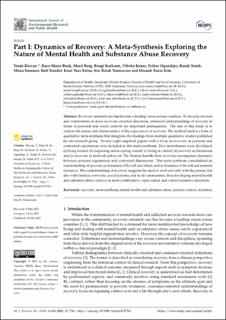| dc.contributor.author | Klevan, Trude Gøril | |
| dc.contributor.author | Bank, Rose-Marie | |
| dc.contributor.author | Borg, Marit | |
| dc.contributor.author | Karlsson, Bengt Eirik | |
| dc.contributor.author | Krane, Vibeke | |
| dc.contributor.author | Ogundipe, Esther | |
| dc.contributor.author | Semb, Randi | |
| dc.contributor.author | Sommer, Mona | |
| dc.contributor.author | Sundet, Rolf | |
| dc.contributor.author | Sælør, Knut Tore | |
| dc.contributor.author | Tønnessen, Siw Heidi | |
| dc.contributor.author | Kim, Hesok Suzie | |
| dc.date.accessioned | 2022-05-09T13:13:36Z | |
| dc.date.available | 2022-05-09T13:13:36Z | |
| dc.date.created | 2021-07-22T11:59:04Z | |
| dc.date.issued | 2021 | |
| dc.identifier.citation | Klevan, T., Bank, R.-M., Borg, M., Karlsson, B., Krane, V., Ogundipe, E., Semb, R., Sommer, M., Sundet, R., Sælør, K. T., Tønnessen, S. H. & Kim, H. S. (2021). Part I: Dynamics of Recovery: A Meta-Synthesis Exploring the Nature of Mental Health and Substance Abuse Recovery. International Journal of Environmental Research and Public Health, 18(15), Artikkel 7761. | en_US |
| dc.identifier.issn | 1661-7827 | |
| dc.identifier.uri | https://hdl.handle.net/11250/2994834 | |
| dc.description.abstract | Recovery-oriented care has become a leading vision across countries. To develop services and communities in more recovery-oriented directions, enhanced understandings of recovery in terms of personal and social contexts are important prerequisites. The aim of this study is to explore the nature and characteristics of the experiences of recovery. The method used is a form of qualitative meta-synthesis that integrates the findings from multiple qualitative studies published by one research group. Twenty-eight empirical papers with a focus on recovery as personal and contextual experiences were included in this meta-synthesis. Five meta-themes were developed: (a) being normal, (b) respecting and accepting oneself, (c) being in control, (d) recovery as intentional, and (e) recovery as material and social. The themes describe how recovery encompasses dynamics between personal experiences and contextual dimensions. This meta-synthesis consolidated an understanding of recovery as dynamics of the self and others, and as dynamics of the self and material resources. This understanding of recovery suggests the need to work not only with the person, but also with families, networks, social systems, and local communities, thus developing mental health and substance abuse services in more collaborative, open-ended, and context-sensitive directions. | en_US |
| dc.language.iso | eng | en_US |
| dc.rights | Navngivelse 4.0 Internasjonal | * |
| dc.rights.uri | http://creativecommons.org/licenses/by/4.0/deed.no | * |
| dc.title | Part I: Dynamics of Recovery: A Meta-Synthesis Exploring the Nature of Mental Health and Substance Abuse Recovery | en_US |
| dc.type | Peer reviewed | en_US |
| dc.type | Journal article | en_US |
| dc.description.version | publishedVersion | en_US |
| dc.rights.holder | © 2021 by the authors. | en_US |
| dc.source.volume | 18 | en_US |
| dc.source.journal | International Journal of Environmental Research and Public Health (IJERPH) | en_US |
| dc.source.issue | 15 | en_US |
| dc.identifier.doi | https://doi.org/10.3390/ijerph18157761 | |
| dc.identifier.cristin | 1922409 | |
| dc.source.articlenumber | 7761 | en_US |
| cristin.ispublished | true | |
| cristin.fulltext | original | |
| cristin.qualitycode | 1 | |

